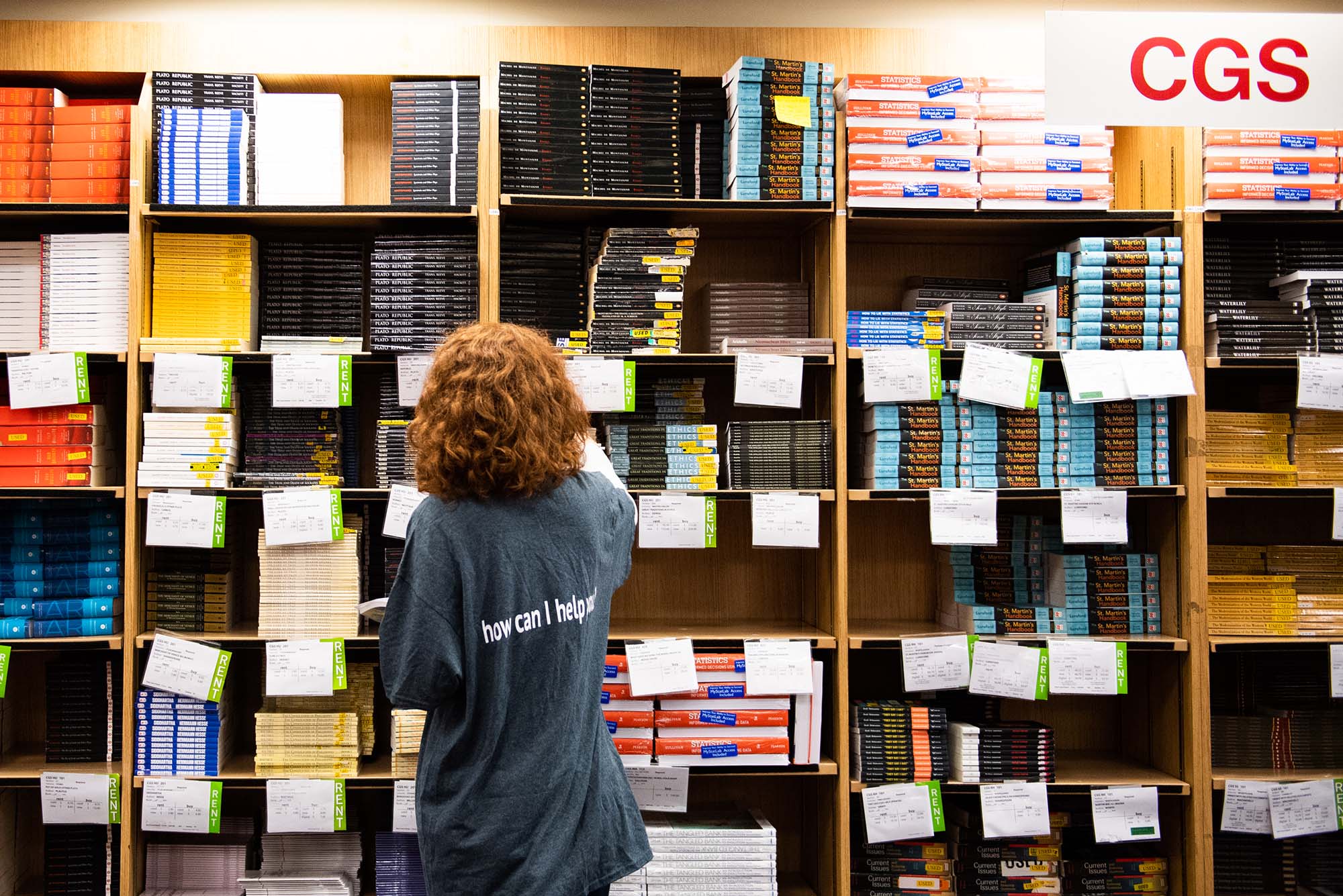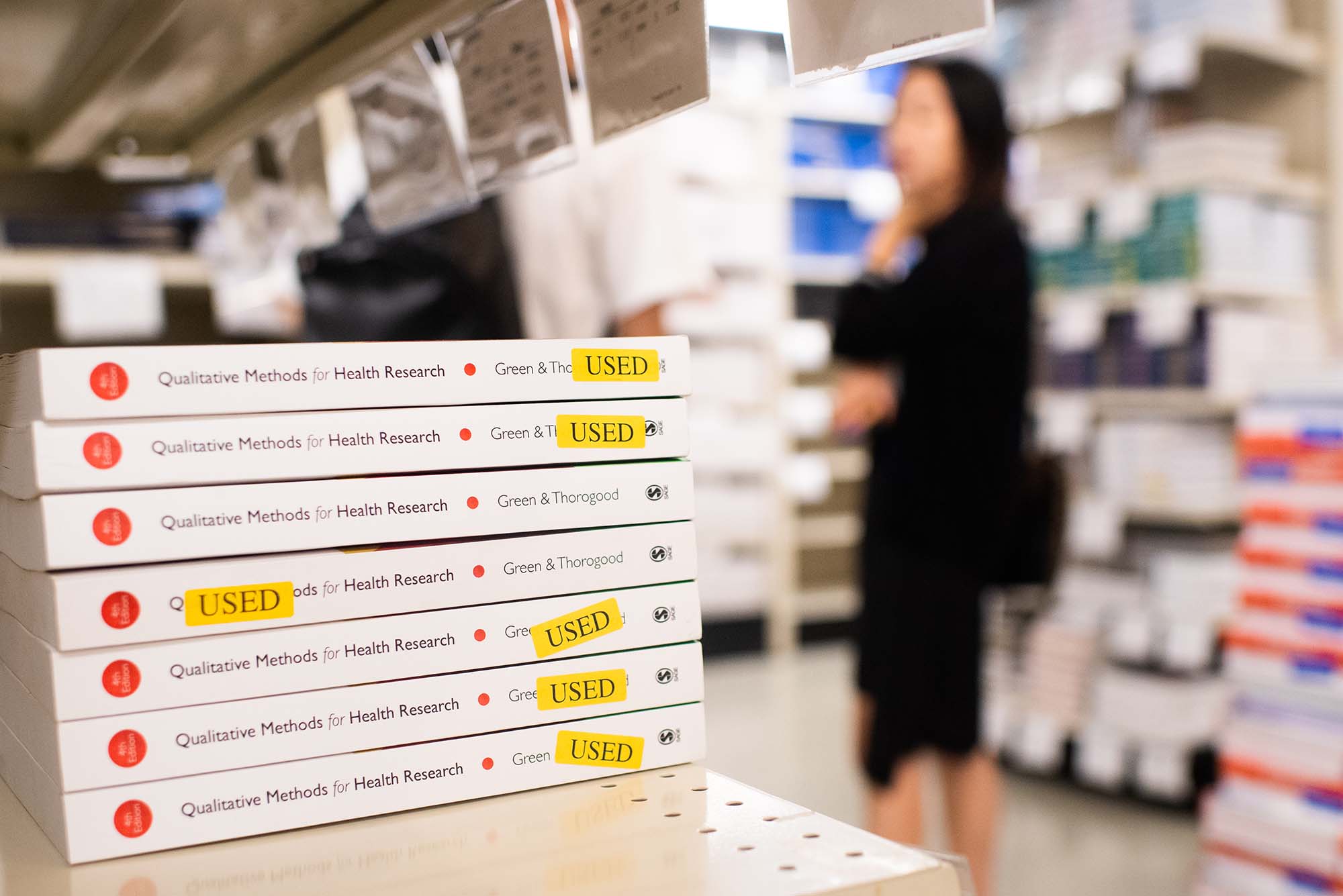Textbooks 101: How to Get the Best Deals on College Textbooks
Tips for how to buy what you need without breaking the bank

This year, nearly 75 percent of all textbooks at Barnes & Noble @ BU are available as rentals, which can lead to big savings.
Shopping for Textbooks? Here’s How to Get the Best Deals
Tips for how to buy what you need without breaking the bank
Pull out your planner and first day of school outfit because the start of classes is almost here! September 5 marks the beginning of the fall semester and with it comes the annual rush to buy textbooks.
For those new to college book-buying, be prepared for some sticker shock. According to educationdata.org, in 2022 the average textbook cost $105.37.
Luckily, there are steps you can take to minimize the prices you pay. We’ve put together a guide to help you save big.
For most students, Barnes & Noble @ BU, at 910 Commonwealth Ave., is the most convenient choice for buying books. If you don’t want to visit the West Campus store, you can order your books via the BU Student Link. Just go to the “Current Schedule” page, then click “Buy Books.” From there, you can pick up the books in the store or opt to have Barnes & Noble deliver them to your address.
It’s important to note that most of the books you’ll need for your classes are available digitally, used, and/or for rent, says Kurt Mahnke, Barnes & Noble @ BU manager.
“Rental and digital options provide the most flexibility to the student and the most affordable way for them to get access to their course materials and complete their coursework,” Mahnke advises.
Barnes & Noble @ BU offers rental options for nearly three quarters of its books. While the exact price varies, Mahnke says, students can expect a roughly 60 percent discount on rentals. Purchasing a used book can save students approximately 25 percent over the cost of a new one.
Beyond offering books in a variety of formats, Barnes & Noble @ BU has a price match program. If a certain physical book has a lower price on amazon.com or BN.com, the BU store will match that price. Additionally, the store app lets you compare editions and prices of books when you look them up by title or ISBN.
But for all Barnes & Noble @ BU’s perks, convenience comes at a price. Many students turn to outside vendors in search of cheaper deals. It’s best to compare prices to find the best buy, particularly for digital options.
Some opt to sign up for subscription services that charge a monthly fee to access a catalog of digital textbooks. On Perlego, a monthly fee of $18 provides access to over a million textbooks. Similarly, Scribd charges $12 a month, and in return, students can select from more than two million e-books.

Individual textbook publishers have increasingly put more focus on their online platforms, allowing students to subscribe and gain direct access to their e-books without having to deal with a retailer. These platforms also include practice questions, assignments, and extra activities. Some professors require students to subscribe to these sites because they may include the e-book’s practice problems in their curriculum and grade them as assignments.
Two of the most popular publishers are Cengage and Pearson. Cengage Unlimited’s four-month subscription for $69.99 offers free hard copy rentals (excluding shipping). The site’s premium option, which costs $124.99, allows students to access online learning platforms with practice questions and other resources. Pearson’s MyLab also offers learning tools and e-books, but price and availability depend on the course.
Divya Virmani (CAS’25) says she prefers e-books because she can add the end-of-chapter summaries easily to her own study materials. “It’s easy to copy, paste, and highlight,” Virmani says. “A lot usually have notes, and I can copy and paste that into my own notes.”
If highlighting and physical page-turning is more your style, some sites offer deals on physical textbooks. Ziffit is an online marketplace where users buy and sell used textbooks, often for a low price. On the BookScouter app, you can compare new and used textbook prices across over 20 different vendors.
Don’t overlook traditional sites like Facebook Marketplace, Craigslist, Amazon, and Ebay, says Huleymatu Sow (Sargent’25), who says she prefers to rent textbooks on Amazon.
Both Sow and Virmani recommend that freshmen plug into BU’s social media platforms to score good deals on used textbooks.
BU Class Facebook pages and the official BU subreddit are good places to start, Sow says. Students can also share books with friends or ask their professors for extra copies. “Definitely check upperclassmen’s Facebook pages,” she advises—they’re often anxious to unload books they purchased for previous classes.
Whichever option you go with, make sure you ask yourself these questions before you decide whether to rent or buy new, purchase a physical textbook, or buy an e-book: Do you prefer using a device for all your classes? If so, a digital textbook might be better than a physical one.
How likely are you to reuse the textbook once the semester ends? If you’re a humanities major taking Physics 101 for Hub credit, and you’re not likely to read up on the force of gravity in your spare time, save the bucks and rent your textbook.
And most important, wherever you choose to make your purchases, read the fine print on your rental contracts. Some companies and websites charge a hefty buyout fee for excess highlighting or annotations.
For Barnes & Noble @ BU rentals, Mahnke says, students won’t run into trouble for light markups. “We expect you to use the book, it just needs to come back in a condition that we will be able to rent or sell to another student,” he says.
In the event you drop a class, keep in mind some rental contracts don’t allow returns after a certain period. This date could come before the deadline for dropping a class. At Barnes & Noble @ BU, the return deadline extends to October 11, which is also the last day to drop fall semester classes.
Finally, whether rented, bought, old, new, digital, or physical, make sure your textbook is the correct edition, as specified by your professor.
Whatever method you choose, Mahnke’s main advice is to buy early. “I think if you’re prepared on day one, you’re going to have a better chance of being successful,” Mahnke says.

Comments & Discussion
Boston University moderates comments to facilitate an informed, substantive, civil conversation. Abusive, profane, self-promotional, misleading, incoherent or off-topic comments will be rejected. Moderators are staffed during regular business hours (EST) and can only accept comments written in English. Statistics or facts must include a citation or a link to the citation.